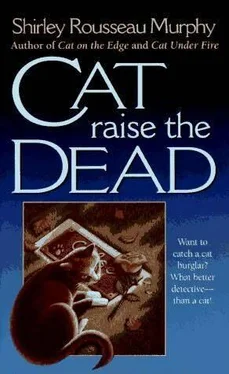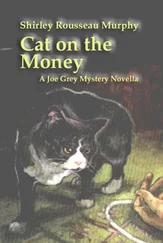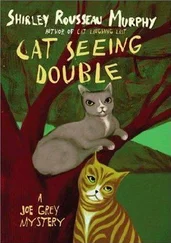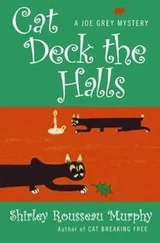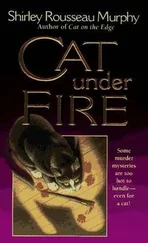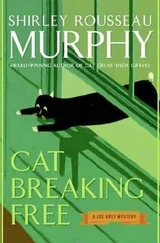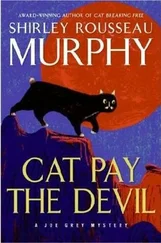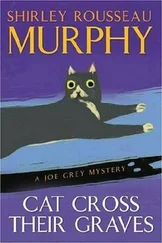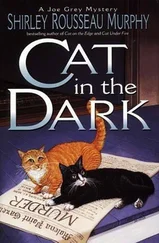The old lady was very pale, but so were a lot of old people. Her white hair fanned out in a halo onto the white pillow, hair so thin he could see her pale pink scalp beneath. Her wrinkled cheeks and mouth were drawn in, her pale blue eyes were rimed with milky circles. Her lids were reddened, too, and at the corners of her eyes liquid had collected. Dampness shone at one side of her mouth in a small line of drool.
A nurse bent to wipe her face, taking such gentle strokes she seemed hardly to touch the old woman. Behind the nurses in the hall, two visitors appeared, figures robed in black, stepping heavily into the room, two square and hefty old women dressed all in black like two Salvation Army bell ringers.
Their gray hair, frizzed close to their heads, formed little caps as kinky as steel wool. Their shoes were black and sturdy, their black skirts reached nearly to the floor. They seemed as ancient as the bed's occupant, but of a different breed. These two ladies looked indestructible, as if they had been tempered perhaps by some demanding religious sect. Or maybe the vicissitudes of life, alone, had toughened them, just as old leather becomes tough.
The shorter of the two carried a brightly flowered handbag of quilted chintz, its yellow and pink blooms screaming with color against her sepulchral attire. The taller lady bore in her outstretched hands a small bowl covered with a white napkin. Adelina Prior moved behind them, shepherding them inside. She wore beige today, a tailored suede dress that showed less leg, and she wore less makeup, her eyes almost naked, her lips a flesh-colored tone.
The women paused uncertainly by the foot of the bed, watching the patient. She lay with her eyes closed, whether in sleep or out of shyness or bad temper was impossible to tell. The two black-robed ladies leaned forward, peering.
"Mary Nell? Are you awake? It's Roberta and Gustel."
"Mary Nell? Can you hear us? It's Cousin Roberta and Cousin Gustel."
When the patient didn't open her eyes, Ms. Prior took the ladies' arms and guided them to a pair of upholstered chairs that had been drawn up at the side of the bed, the backs to the wall and facing, across the bed, the glass doors. The black-clad women sat woodenly. The shorter lady leaned forward. "Mary Nell, it's Roberta. Are you awake?" As she leaned, she deposited her flowered handbag on the floor. The tall lady remained silent, clutching her bowl in her lap.
Joe, dropping down from Dillon's arms, slipped behind the orange tree, then leaped up into its branches. The sky had grown darker, and the clouds were moving fast. A damp wind scudded through the branches, shivering the leaves. He settled in a fork where he could see out between the moving leaves, directly down upon the bed, upon Mary Nell Hook and her two sturdy cousins. He could see, as well, beneath the bed, Dulcie's two hind paws and the tip of her twitching tail.
Dulcie's view was restricted to the floor, the bed legs, a corner of the blanket hanging down, and the high-topped black shoes of the visitors. Each woman, when seated, kept her feet flat on the floor as if to assure adequate balance. Above their ankle-high shoes, two inches of leg were encased in thick, black corrective stockings- a sharp contrast to Adelina's silk-clad ankles and creamy pumps, her sleek narrow foot tapping softly beside the bed. The two ladies smelled of mothballs, a strange mix when combined with Adelina's perfume and the sweet aroma of vanilla from the bowl that Gustel held. These, with the strong air freshener that had been sprayed earlier, left her nose nearly numb. But she did catch a whiff from the bed above, of nail polish remover. This seemed a puzzling aroma to be associated with a frail, bedridden lady. But maybe she liked nice nails-though one couldn't see them beneath the white cotton gloves.
She could see Dillon standing beyond the glass door and draperies, a shadow among shadows in the darkening patio, a subtlety probably not detectable by human eyes. She had seen Joe streak for the tree-he was hidden, now, high among the leaves-but she caught a glimpse of his yellow eyes, watching.
A chair creaked as if the short lady had leaned forward. "Mary Nell? Mary Nell, it's Roberta. Open your eyes, Mary Nell. It's Roberta and Gustel."
There was a rustle of the covers as if Mary Nell had turned to look at her visitors.
"Mary Nell, Cousin Grace sends her love," Gustel said. "I've brought you a vanilla pudding."
Mary Nell murmured, faint and weak.
"Her husband Allen's son is graduating from Stanford, and we came out to the coast for the ceremony, and, of course, we wanted to see you; it's been years, Mary Nell."
Mary Nell grunted delicately.
"Do they treat you well? We talked with your trust officer, and she said they are very kind here."
Another soft murmur, a bit more cheerful.
The conversation progressed in this vein until Dulcie had to shake her head to stay awake. From Mary Nell's responses, the patient, too, was about to* drift off. The cousins took turns talking, as if they had been programmed by some strict familial custom which allowed exactly equal time to all participants. Mary Nell's answers remained of the one-syllable variety. Not until Gustel began to talk about the old school where Mary Nell had taught did the patient stir with some semblance of vigor.
Gustel, holding her pudding gently on her lap, told about the grandchild of one of Mary Nell's students, who was now vice principal of that very same school. When she described for Mary Nell the new modern gymnasium with a skylight in the dome, this elicited from Mary Nell her first decipherable comment. "A light in the roof. Oh my. And little Nancy Demming, just imagine, she was no bigger than me."
"We have all your old history books and cookbooks, Mary Nell; we're keeping them for the great grandchildren."
"A regular window," Mary Nell said. "A regular window in the roof." The springs grumbled as if she had shifted or perhaps leaned up for a better look at her cousins. It was at this moment that Dulcie saw Mae Rose.
Mae Rose had abandoned her wheelchair and was creeping along the hall. Walking unsteadily, clutching at the wall, she was headed for the open door.
Dulcie had left Mae Rose near the front door, in the parlor. When Mae Rose stopped to wait for Eula, Dulcie had lost patience, leaped down, and streaked in through this door behind the nurses' feet. She thought that not even Dillon peering in through the glass had seen her as she slid beneath Mary Nell's bed.
She didn't know why Mae Rose had left her wheelchair; it frightened her to see the little woman walking so precariously. She did not see Eula, though she could see a good slice of hall from where she crouched; it was only close up that her view was limited to chair legs and feet. Mae Rose crept along to the door, clutching her little doll Lucinda and hanging on to the wall. Moving inside, she approached the bed, drew so close that Dulcie could see only her pale, bare legs and her bright pink slippers. The smell of air freshener was so strong she couldn't even catch Mae Rose's sweet, powdery scent. Just the chemical smell of fake pine.
Wanting to see more, she reared up behind the bed, shielded by Mary Nell's plumped pillows, and peered out through a tiny space beside Mary Nell's left ear. She watched Mae Rose lean over the bed, smiling eagerly at Mary Nell, holding out the doll. Mary Nell grunted, perhaps startled at the proximity of the doll. When she leaned up a few inches from the bed, Mae Rose pressed the doll toward her, as if by way of a loving gift.
The cousins, sitting beside the bed like two black crows, watched this exchange with blank stares. And Dulcie drew back imperceptibly, deeper into the shadows behind the bed.
She felt that if either cousin spotted her, escape would be imperative. And now suddenly Eula appeared in the hall, stumping along in her walker. Behind Eula came a scowling nurse, pushing Mae Rose's empty wheelchair.
Читать дальше
